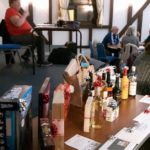Source Multiple Sclerosis News Today:
A blood-clotting protein called fibrinogen prevents myelin production and blocks the neuron remyelination repair process in mice, a study finds.
The study, “Fibrinogen Activates BMP Signaling in Oligodendrocyte Progenitor Cells and Inhibits Remyelination after Vascular Damage,” appeared in the journal Neuron. Its conclusions offer new insights and open new therapeutic avenues for multiple sclerosis (MS) and Alzheimer’s disease, among other illnesses.
One common feature of several neurological disorders is the loss of the myelin layer that normally surrounds neurons. Myelin is essential not only to protect the neurons but also to let them process and transmit the electric pulses they use to communicate with each other. When myelin is degraded, neurons can not work properly and they eventually die. Read on.







